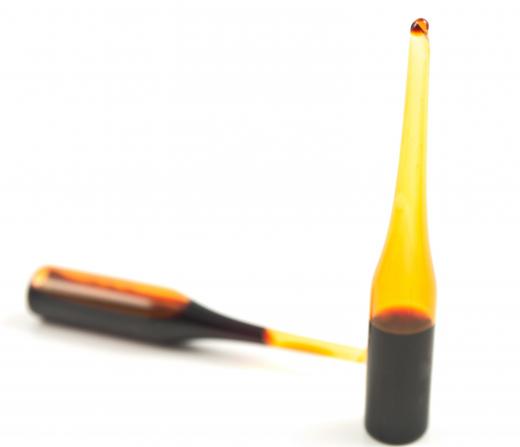What is Iodide?
 Malcolm Tatum
Malcolm Tatum
Iodide is a form of iodine that carries a slightly different atomic charge and normally is chemically bound with an element of potassium or sodium. While many people use the two words interchangeably, that is not exactly correct. An iodine atom will not possess the negative one charge that is found with an iodide ion. In addition, there are some applications for iodine that are not suited for this form, and vice versa.
There are a number of different iodide compounds that are in use for a number of purposes. Hydrogen and potassium iodide are two examples of ions that can be used in antioxidant applications. Sodium iodide can help in the preservation of tissues and similar materials. Other forms include silver, nitrogen, and carbon iodide. Many of these variations are naturally occurring, but can be created in a laboratory as well.

One medical application of iodide ions is in the treatment of hyperactive thyroids. Essentially, the ion can aid in blocking the release of excess thyroid hormone into the bloodstream, thus helping to curb symptoms such as anxiety and nervous agitation. However, it should be noted that its use in this application is seldom conducted as a stand-alone treatment. Because hyperthyroidism normally manifests a number of different symptoms, iodide is usually one ingredient in medications that address the task of managing symptoms and restoring a balance to the production of thyroid hormones. In addition, some modern thyroid treatments forego the use of this ion altogether, noting that the blocking effect may backfire once treatments are discontinued.

Iodide is a naturally occurring substance that appears throughout nature. One of the richest portions are in the oceans. Algae is an excellent source. The cells of the algae require some type of protective coating in order to thrive. Iodide is one of the components that help to provide that protection. Plankton also serves as a rich depository, along with containing selenium and various fatty acids.
AS FEATURED ON:
AS FEATURED ON:














Discussion Comments
So what does it mean when sea salt says this does not contain iodide a necessary nutrient? Is it bad to have natural salt with iodide missing? Can we get iodide in other food?
I am on a special low-iodine diet for thyroid cancer. Can I have sea salt that is iodide free? Is iodine the same thing as iodide when reading food labels?
Iodine and iodide are closely related scientific terms but as the article makes clear are quite different. (Chlorine will kill you but sodium chloride is salt, for example.)
Iodine is a solid. But it sublimates, goes straight from solid to gas. Crafty.
Bromine is a liquid at standard temperature and pressure. (I think mercury may be the only other element which is a liquid at stp, though in the back of my mind there lurks I think a third).
i don't know what i am doing. my teacher had us adopt an element (we did not get to pick)and i got iodide at first. i have no idea what it even was but i have been researching and that has helped some but my book said iodine is a solid. My mom thinks it's a liquid and some places have said it's a gas. What is it?
Thank you so much for the information. I am doing a science fair project over iodide and it has helped me a lot. Thank you.
Post your comments